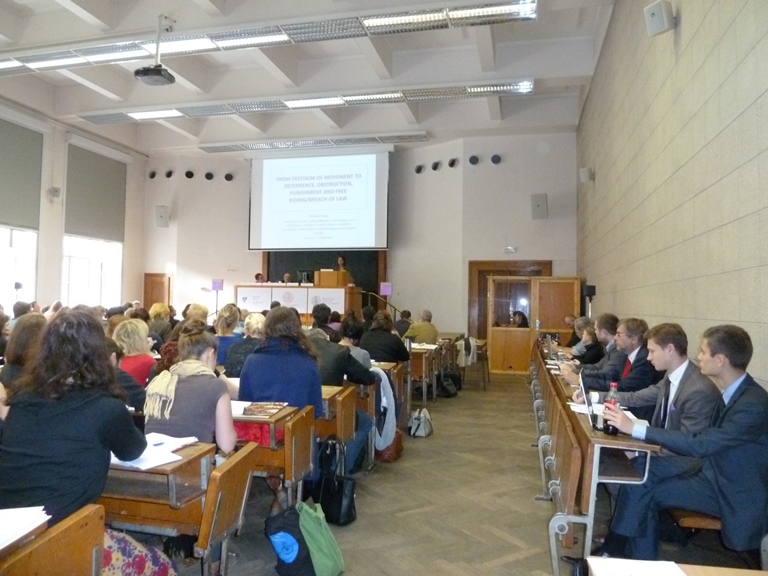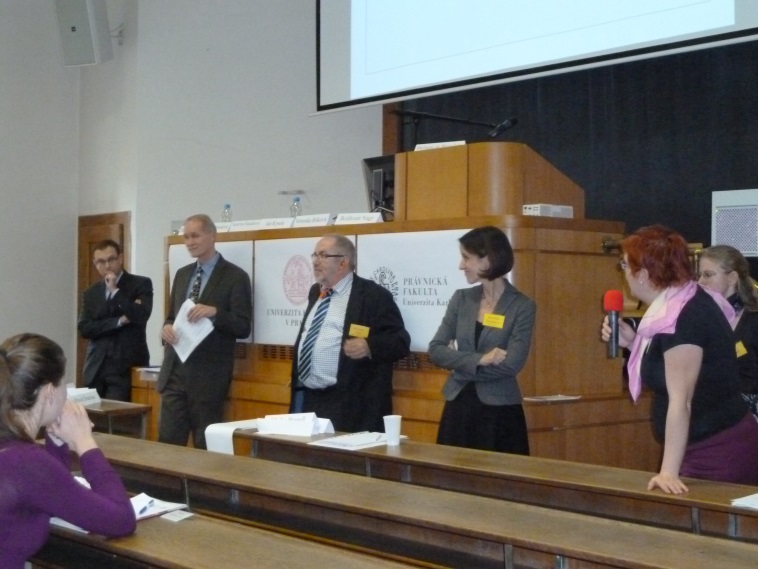Voices from the Sylff Community
Feb 10, 2016
[Report] The Refugee Crisis in Europe and the Role of the Czech Republic
Keita Sugai
Martin Faix and Věra Honusková, Sylff fellows from Charles University in Prague, organized a conference on the migrant and refugee crisis in Europe that was supported by an SLI grant. Tokyo Foundation director Mari Suzuki and program officer Keita Sugai attended the conference as observers. The following is a report by Keita Sugai.
* * *
Introduction
The migrant and refugee crisis in Europe has the potential to precipitate social and geopolitical changes that could prompt the European Union to thoroughly reexamine its border policy from political, pragmatic, and humanitarian perspectives. Today, news of refugees fleeing from war-torn, failed states or oppressive dictatorships reaches readers around the world every day, and the issue has elicited both sympathy and hostility toward the migrants within the EU. While EU ministers voted for a plan to relocate 120,000 migrants and refugees in September 2015, central European countries, including Romania, Hungary, the Czech Republic, and Slovakia, voted against the plan. The issue has been highly divisive.
In an attempt to gain a fuller understanding of this issue through objective, impartial discussion, Sylff fellows Martin Faix and Věra Honusková organized a one-day conference in Prague—supported by a Sylff Leadership Initiatives (SLI) grant—that focused on the legal dimensions of the debate. As an observer at the conference, I became acutely aware that the legal foundations of the refugee issue were often completely overlooked in the discussions intended to consider and articulate the plight of the refugees.
The SLI-funded conference on the “Refugee Crisis on the Borders of Europe and the Role of the Czech Republic” was held on November 12, 2015, at Charles University in Prague, from whose Faculty of Law both Faix and Honusková received their PhDs. The fellows have profound legal knowledge of refugee-related issues, with Honusková having substantial practical experience through her career at an NGO and in academia.
In this report, I will first provide background information and then summarize the main arguments for the legal foundations of this issue, along with other topics covered at the forum. I will also share my observations on how the two Sylff fellows succeeded in fulfilling the purposes of the conference.
Background Information
In my conversations with the fellows, I learned that the refugee issue has been politicized in their country and that attempts to stir up public sentiment have resulted in strong anti-refugee opinions and policies. When the number of refugees entering the EU increased dramatically in spring 2015, discussions oriented toward accepting them were difficult to initiate because the political environment was very negative. This was challenged by humanitarian groups on several occasions, and a groundswell of sympathy emerged when the photo of a Syrian boy found dead on the southern Turkish coastline caught worldwide attention. Arguments were made calling for a more flexible policy, and stakeholders became more willing to listen to different viewpoints.
Faix and Honusková carefully timed the conference to coincide with this shifting mood. Their primary objective was to examine the legal foundations of the refugee issue, and waiting until November was quite fortuitous, as policy stakeholders became more interested in different perspectives and were in need of objective policymaking guidelines.
They were successful in laying out the legal foundations in the presence of diverse stakeholders: Speakers included academics from the Czech Republic, Belgium, Hungary, and Austria; administrators from the Czech Ministry of the Interior and the Office of the Public Defender of Rights; and a judge from the Czech Constitutional Court. Their presentations stimulated intense debate, which, as planned, sometimes became very heated. Audience members included academics from domestic and other EU universities, Czech public officials and administrators, and media personnel. This diversity of participants enabled information to be conveyed from a broad spectrum of viewpoints and facilitated multifaceted discussions.
Legal Foundations
This report will not delve into the technical details of the debate, and I will only provide the essence of the legal foundations presented and discussed during the conference.
Schengen Agreement and Dublin Regulation
Legally speaking, the refugee crisis has seriously diluted the effectiveness of two important EU agreements signed by most member states. One is the Schengen Agreement, which abolished internal border controls to allow individuals to move freely within the Schengen Area. In response to the massive influx of migrants, however, some countries closed their borders to prevent their entry. These countries point to national security concerns. Many experts believe that the Schengen Agreement is no longer working and that it needs to be reconsidered.
The other is the Dublin Regulation, under which almost all migrants seeking asylum in the EU must apply to the first country of entrance—which then is responsible for reviewing the application. This convention is being questioned from the viewpoint of practicability, as it forces coastal states like Italy and Greece to be inundated with applications. Germany’s announcement in August 2015 that it will accept applications from Syrians who had neither applied for refugee status nor had their applications reviewed was seen as the moment that made states give up on the strict enforcement of the Dublin Regulation.
It is important to note, though, that the massive scale of the migration in 2015 was totally unforeseen by these two agreements. This is not to say that they are flawed but that emergency, intervention measures are needed.
Convention on Refugees
The 1951 Geneva Convention relating to the Status of Refugees is a UN multilateral treaty that contains a definition of a refugee, the rights of individuals granted asylum, and the responsibilities of nations granting asylum.
According to the definition that was amended in a 1967 protocol, a refugee is a person who is outside the country of his/her nationality and is unable or unwilling to return owing to a “well-founded fear of being persecuted for reasons of race, religion, nationality, membership of a particular social group or political opinion.” Refugees are protected by the principle of “non-refoulement,” or forcible return, which the parties to the convention must observe. It is a safeguard to prevent refugees from being returned against their will to territories where their life or freedom could be threatened.
The speakers talked of the convention as something like a Magna Carta, serving as the basis of all other legal documents on the rights and entitled protections of refugees.
European Union Law
Article 67 of European Union law (Consolidated versions of the Treaty on European Union and the Treaty on the Functioning of the European Union) states: “[The Union] shall ensure the absence of internal border controls for persons and shall frame a common policy on asylum, immigration and external border control, based on solidarity between Member States.” Article 77, meanwhile, states: “The Union shall develop a policy with a view to: (a) ensuring the absence of any controls on persons, whatever their nationality, when crossing internal borders; . . . [and] (c) the gradual introduction of an integrated management system for external borders.” And Article 78 states: “The Union shall develop a common policy on asylum, subsidiary protection and temporary protection with a view to offering appropriate status to any third-country national requiring international protection and ensuring compliance with the principle of non-refoulement.”
The provisions concerning asylum for refugees thus reaffirm the Refugee Convention’s protocol regarding the rights of refugees and responsibilities of member states. It is notable that EU law upholds a “common policy” on the protection of refugees. This is a strong argument for EU member states to undertake necessary measures collectively, especially if the Schengen and Dublin agreements are not fulfilling their originally envisioned common policy goals.
What emerged from the conference was a message that member states are required, under the Geneva Convention and EU law, to provide relief measures for refugees to some extent but that they can fulfill those requirements in a number of ways. There is a need to respond to the humanitarian crisis, but states do not necessarily have to allow all people who come to Europe’s shores to settle in the EU. The issue is made more legally complicated by the fact that many of those entering Europe are not refugees in the conventional sense. The most difficult and controversial aspects of the issue are how the legal foundations should be applied in enabling practical policy measures when political interests and orientations dictate a different response. EU member states were divided over their policy choices, as the actual number of migrants in 2015 far exceeded levels envisioned under the current policy framework.
Many of the EU members opposed to allowing the entry of refugees, including the Czech Republic, pointed to national security concerns. The tone of the debate was dominated by a sense of crisis, and political emotions ran high, fostering negative views toward the acceptance of refugees.
The conference highlighted the point, though, that EU member states cannot avoid their responsibilities. The fellows explained to me that many participating political and government officials, as well as the mass media, came away from the conference with a heightened interest in the legal dimensions of the issue. There is no doubt a need to keep political emotions in check and encourage more objective discussions; this conference could be the first step toward that goal.
The fellows were thus very careful about downplaying the influence of emotion and creating an environment conducive to objective, sober debate. For example, speakers were discouraged from using visual images of refugees, particularly of children, which could trigger a sympathetic, humanitarian response.
Other Issues
These discussions raised more fundamental questions about the nature and role of the European Union. The EU was established to consolidate certain functions of national governments and promote solidarity. Member states must act as one on a broad range of policy issues. The refugee crisis alone will not erode the EU’s spirit of solidarity, which is required in addressing the many challenges it faces, including financial crises, economic stagnation and unemployment, conflict with Russia over Ukraine, and Britain’s possible withdrawal. But a critical mistake in a key policy area could produce seeds of fragmentation. The fact that the conference addressed the refugee problem with reference to fundamental aspects of the EU was an excellent idea.
Another insight into the fundamental aspects of the refugee crisis was gained through the introduction of historical documents from about a hundred year ago, which showed that sovereign states did not have a key role in maintaining migrant controls. Culture was, in some ways, a bigger factor in human mobility, not only leading to a reexamination of the status quo but also prompting major changes. Adapting to changing circumstances enabled cultures to grow stronger, thereby facilitating their continued and sustainable development. Discussions of the refugee crisis thus shed new light on the fundamental role and historical significance of the EU process.
Conclusion
The Sylff Leadership Initiatives program is intended to support fellows wishing to address socially relevant issues. Honusková and Faix were well aware of the aims of SLI and had a shared interest in taking an objective look at the influx of migrants into Europe. Their efforts to promote thorough debate from a legal point of view—whose importance had often been overlooked—contributed to the success of the conference. Honusková and Faix are both experts on the legal aspects of the refugee issue; the two worked effectively as a team, with Honusková taking the lead in shaping the substance of the discussions, while Faix was mainly responsible for administrative matters.
There was no time to bask in the afterglow of their success, however. On November 13, 2015, only one day after the conference, terrorists launched coordinated attacks in Paris that killed over a hundred people. This tragedy has negatively impacted on efforts to protect and accept refugees, making it all the more imperative to promote levelheaded, legally grounded debate. I have invited Faix and Honusková to write about the conference and the refugee crisis in their own words in a forthcoming Voices article.




